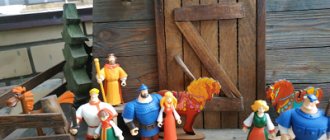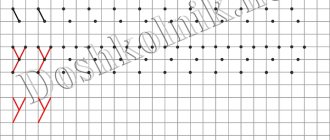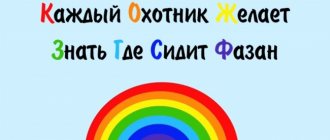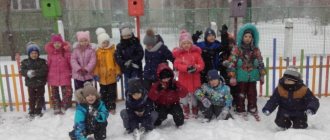Class hour 3 - 4 grade. My friend is a book
Class notes for grades 3-4
Methodological development of the class hour “My friend is a book”
Author: Anpilogova Lyubov Nikolaevna. primary school teacher, MKOU » Lozovskaya primary school-kindergarten » Verkhnemamonsky municipal district of the Voronezh Region Purpose: this development of a classroom lesson will be useful for class teachers, primary school teachers, aspiring librarians;
intended for students in grades 3-4 Purpose:
to clarify students' understanding of the meaning of a book for a person
Tasks:
to introduce students to the history of the creation of the book, the development of reading skills, the cultivation of a caring attitude and love for books Equipment: an exhibition of books of different formats and different genres;
portraits of writers, packages with a set of cut-out pictures of the works they read. Progress of the class hour:
1. Organization and mood on the topic. Teacher: Not a bush, but with leaves, Not a shirt, but sewn. Not a person, but speaks. (Book) So, guys, today we’ll talk about our faithful friend and assistant in acquiring knowledge - the book. The role of books in our lives is very great. He who reads little knows little. “He who reads a lot knows a lot,” says the popular proverb. And so it is. Books tell us about the Motherland, about its best people. The book is our assistant in study and work. Books teach, educate, show the right path in life. And even a computer cannot replace a book. Explain the meaning of the proverbs: (the proverbs are written on the poster) Reading is the best teaching. A book is a source of knowledge. What other proverbs do you know about the book? Let's sing a song about a book. Our inseparable friend Words by O. Fadeeva Music by E. Kolmanovsky I have a reliable friend, Dear, wonderful friend. You can consult with him and spend leisure time together. With him you divide both joy and anxiety in half, He is familiar and close to many, dear to you too. Chorus: Book, book, Our inseparable friend, You and I, You and I are never bored. Do you want to sail across the oceans, Descend into the depths, Visit many countries And rush to the moon, Be a brave explorer In the thickets of centuries - All edges are open to you On the pages of books. Chorus. Books with many pictures, In painted bindings!.. Moidodyr and Pinocchio Came to us from the first books. And then Timur, Korchagin, Gadfly, Koshevoy Gave us an example of courage, Military friendship! 2. Teacher: Let's talk, guys, about the history of the creation of the book. Books weren’t always like the ones we see now at our exhibition. (Teacher points to books). Let's listen to the message from 4th grade students. Student: Printed books did not appear immediately. The scribe rewrote every phrase, His eyes got tired, his hand trembled. And so it went on for centuries and centuries. The work of a chronicler was very difficult. (Slide show) In the old days, people valued books very much. They were expensive because they were created slowly, at the cost of the painstaking work of the chronicler, who rewrote by hand line by line. The chronicler wrote with a quill pen or a sharp stick on papyrus, birch bark or parchment (thin calfskin). Student: And finally, this time has come, When the printing press was invented. And the book became available a hundredfold, and the man was very happy about it. The machine has grown smarter, smarter, and now they have entrusted the book to the great machine, so that we receive the book, a lot of people worked on it. 10 centuries ago, paper began to be produced in all European countries, including Russia. More than 400 years ago in Russia, Ivan Fedorov and his assistants began to print the first books. The first printing press appeared. (Show slide) Many people from different professions are working on the creation of the book. These are lumberjacks who prepare timber, rafters who make paper from wood, people work on machines to create books, writers and poets create works, scientists write scientific texts, artists draw illustrations, typesetters, bookbinders and many other people work in the printing house. Our ancestors, the Slavs, wrote on birch bark - birch bark. All these books were written by hand, with a quill pen. Then the books became made of metal letters. Artists began to draw pictures, wrote the titles very beautifully, then decorated them with silver and precious stones. Such books were very expensive, only rich people could buy them. People worked on one book for a whole year. And only in 1563 the first printed book was published in Russia. 3. Let's conduct a quiz: 1. Who knows who we call the first printer of the book? (The first printed book was published by the wonderful Russian master Ivan Fedorov.) 2. Where is the monument to Ivan Fedorov installed? (In Moscow) 3. Guys, where are books printed now? (They print on machines in a printing house.) 4. Who is the first to start working on creating a book? (Poets, writers must compose works (poems, poems, stories, fairy tales, novels, etc.). Then the writer’s manuscript goes to the publishing house. This is an institution where books are published. Here the manuscript is read by editors and then sent to the printing house. Then the workers of this printing house print essays and arrange them in the form of a book. They are sent to stores, after which the book appears on our table.) 5. What is the name of the title of the book, the page on which the title is printed, the name of the author, the year and place of publication. (Title Page) 6.Double sheets of thick paper placed between the cover and title page. (Flyleaf) 7. Material that the Arabs invented for books. Without this material, books would continue to be printed on papyrus and parchment. (Paper) 8. The edge of a book block, the place where all the elements of the book are fastened: sheets, gauze, etc. (Spine) 9. A cardboard box designed to protect valuable publications. (Case) 10. A person who collects old books. (Bookstore) 11.In the 15th century. The first printed book appeared in Europe. Who was its creator? (Johann Guttenberg) 12. In 1564, Ivan Fedorov published the first printed book in Russia. What was it called? (Apostle) 4. Travel through the pages of books. Teacher: And now each of you will read a short excerpt from your book, and we will try to name the author and the title of the work. We will also note who reads well and who still needs a lot of work. (Children read excerpts from books) Name the author and show his portrait. (A. Pushkin “The Tale of the Golden Cockerel”, A. Kkkrylov “Fables”, L.N. Tolstoy “story” Shark” E Charushin “Big and Small” V. Bianchi “Forest Travelers”, S. Mikhalkov “Poems”, Russian folk tales) 5. Teacher: How should you treat friends? How should we treat books, After all, they are our friends? Student: Do not wrinkle, do not stain, do not fray the pages, bindings. Books are our best friends, They give us happiness. Student: We are friends with the printed word, If it weren’t for it, We wouldn’t know anything about either the old or the new! Just imagine for a moment, How would we live without books? What would a student do, If there were no books, If everything disappeared at once, What was written for children: From good fairy tales to funny stories?.. Student: You wanted to dispel boredom, Find an answer to the question. He reached out for the book, but it wasn’t on the shelf! Your favorite book is missing - 'Chippolino', for example, And Robinson and Gulliver ran away like boys. Student: No, it’s impossible to imagine that such a moment would arise And all the heroes of children’s books could leave you. From the fearless Gavroche to Timur and to Krosh - How many of them are there, friends of the guys, Those who want the best for us! All the children in chorus: We will always take care of books and never get them dirty. After all, they are friends to us. And we never offend our friends. Teacher: Let's sing a song about our friends - books. The fresh wind hums the voices of distant wanderings, It inflates the pages, Like miracle sails! In the middle of any page miracles come to life, eyelashes do not stick together, eyes run wide! But reading days and nights And sailing on the sea of lines, Stay on the right course! And then they will open the books - Wonderful books - Wonderful life! 6. Competition. "Collect a picture" . Each student is given envelopes with a picture (drawing) cut into 10 parts for a specific work. The student must collect a picture and name the author and the work. Teacher: And at the end of our class hour, I want to read you an excerpt from a poem by N. Pikuleva Read it, girls! Read it, boys! They don’t teach you bad things. Favorite books! Not everything in this world is easy for us, and yet the persistent and wise will achieve what a good Heart strives for: He will open the cage, where the bird is languishing! And each of us will breathe a sigh of relief, Believing that the wise Time will come! And a wise, new Time will come! Summary of the class hour What new did you learn about the history of the book? How is a book born? What is your attitude towards the Book?
We recommend watching:
Class lesson summary on the topic: My family is my wealth, grade 4 Conversation with elementary school students on the topic: Signs Thematic class hour on ecology, grades 3-4 Class hour for grades 2-4. Your free time
Similar articles:
Class hour 4th grade. Russia is my homeland
Class hour 4th grade. Communication culture
Class hour. Tolerance 4th grade
Cool hours in 4th grade
Class hour 4th grade. Teach yourself to study



